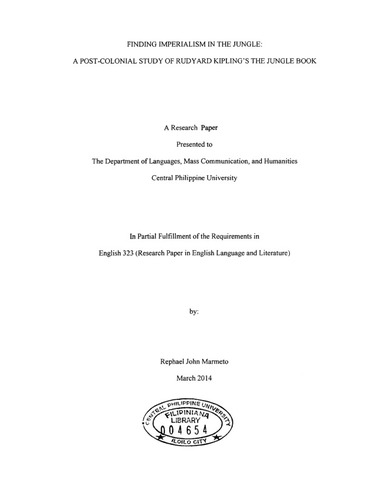Finding imperialism in the jungle: A post-colonial study of Rudyard Kipling’s The Jungle Book

Page views
668Petsa
2014-03May-akda
Tagapayo ng Tesis
Tagapangulo ng Panel ng Depensa
Miyembro ng Defense Panel
Magbahagi
Metadata
Ipakita ang buong tala ng item
Abstract
The study identified the Imperialistic influences on Rudyard Kipling’s The Jungle Book. It aimed to determine and depict imperialism in Kipling’s life and his writings. Furthermore, the Post-colonial Criticism would ascertain the significant aspects in Kipling’s imperialism experience that were parallel to his works. The book was treated with thematic and character analysis with the aid of Post-colonial Criticism. Findings showed that the characters from The Jungle Book contributed to the depiction of imperialism epitomized by the main character, Mowgli. The themes regarding cruelty, abuse, racism, violence, mistrust and colonialism could be identified from his own predicament and struggles in life manifested in the book. Therefore, Kipling’s The Jungle Book is an example of a children’s classic with a deeper meaning aiming to clearly reveal such chaotic event in the author’s life.
Paglalarawan
Abstract only
Mungkahing Sipi
Marmeto, R. J. (2014). Finding imperialism in the jungle: A post-colonial study of Rudyard Kipling’s The Jungle Book (Unpublished special paper). Central Philippine University.
Uri
Special paperMga Paksa
Kagawaran
Department of Languages, Mass Communication and HumanitiesDegree
Bachelor of Arts major in EnglishLokasyon ng Istante
PN 73 .M37 2014
Pisikal na paglalarawan
iii, 56 leaves


